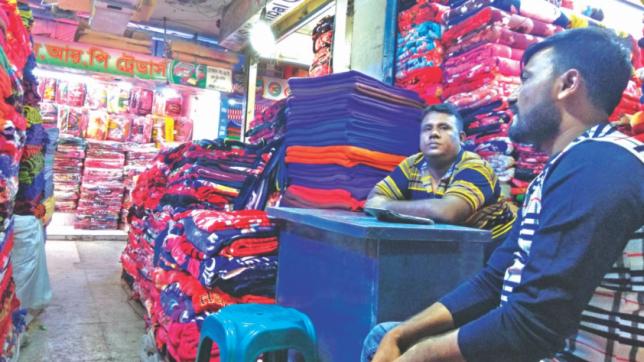Where is winter?

Warm clothes sellers are recording sluggish sales during the current winter season because of higher temperature in January, historically the coldest month of a year.
“We did not get the feeling of winter this year,” said Mohammad Azim Sheikh, a salesman of Akhi Moni Garments at the Nurjahan Market opposite to Dhaka College, on January 27.
The market has been totally dull this month, he said, adding that the winter season kicked off on a positive note.
The demand from consumers began to drop off couple of days ahead of the national election on December 30, according to some salespersons and wholesalers.
The winter of 2017 was good for warm clothes vendors, according to Sheikh. “We had a sales bonanza in the final days of winter.”
This season, his store could sell men's jackets amounting to Tk 2 lakh until January 27, in contrast to about Tk 3 lakh at this point a year earlier.
“It appears that there will be a lot of carry-over stock for manufacturers next season,” Sheikh added.
Sales this winter were 30 percent lower than a year earlier, said Asgar Ali, the in-charge of sales of another clothing store in the same market. January is usually the coldest month of the year, said Arif Hossain, a meteorologist of the Bangladesh Meteorological Department.
This year, the temperature has been higher in January than the previous year, he said earlier this week.
He, however, said higher January temperatures in one or two years cannot be taken as a reflection of climate change.
Officials of the meteorological department yesterday said a mild cold wave was sweeping over 13 districts mainly in some northwest and southwest districts.
The cold wave may get weaker in some places, according to the department's weather forecast. “We still have hope that there will be some sales in the remaining days of winter,” said Mohammad Hridoy Hossain, manager of Salimar Garments at Gulistan's Dhaka Trade Centre, one of the wholesale markets for warm clothes and blankets.
He said they could sell more than 1,350 pieces of jackets out of the 1,500 they bought from the importer for selling during the current winter season.
“We will have to keep these to sell next year.” Salimar sold about 2,000 pieces of jackets last winter.
“We are now selling at less than our purchase prices just to avoid our funds getting stuck up for a year. We would be able to recover the losses if we can realise a portion of the funds and invest on summer clothes,” he added.
However, Mohammad Mizanur Rahman, owner of Chandpur Garments in the same market, has little scope to recover his investment. He bought 30,000 pieces of blankets partly on cash and partly on credit from importers.
And until January 26, he had 3,000 pieces unsold, he said, adding that would have to carry over the stock to next winter as the importers will not accept returns.
“There is no way for us to get out of the situation. On the one hand, I cannot clear dues to importers -- the retailers who have bought blankets from my shop on credit are not clearing their dues,” he added.
Md Ali Akkas, owner of Abir Fashion in Bangabazar area, one of the popular markets for retail and wholesale in the city, said his stores could log sales of 5,000 pieces of blankets until January 26.
Last year, total sales were 10,000 pieces.
“Sales began to decline ahead of the election as people did not come to the market amid restriction on movement of vehicles. After the election, sales tumbled.”
Akkas, however, is hopeful that a portion of his stock would get sold during the remaining of the days of winter, particularly around the Biswa Ijtema, the second largest congregation of Muslims after Hajj, which is due to take place in the middle of February.
